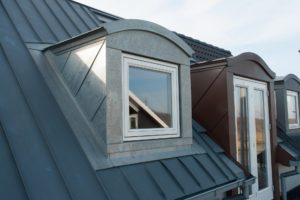Common Misconceptions About Metal Roofing

Modern design vertical roof window with black light metal covering
From its durability and energy-efficiency to the amazing return on investment, there are several reasons to choose metal roofing.
The only thing that is keeping you from choosing metal roofing over traditional asphalt shingles is some second-hand information you’ve received from your friends, family, and neighbors. The majority of this information is based upon myths and misconceptions, and once you learn the truth about metal roofing, chances are you will get excited about your purchase.
Here are a few of the most common myths associated with metal roofing.
A Metal Roof Will Eventually Rust
Rust occurs when oxygen and moisture come into contact with iron, an alloy that is found in steel. This natural phenomenon is often the reason why many people mistakenly believe that a metal roof will eventually rust.
With proper care and the right product, your metal roof will last a lifetime, and you will never notice a single spot of rust. This corrosion-resistance is possible because quality metal roofing features a metallic coating on both sides of the steel or aluminum core. This metallic coating, in addition to primer and paint, will protect the interior metal and help prevent rust formation.
In addition to traditional steel and aluminum roofs, if you want the most corrosion-resistance possible, opt for a zinc roof. In addition to naturally preventing the formation of rust, zinc is also very low-maintenance, and because it’s pliable, it can be formed into several different interesting architectural shapes.
A Metal Roof Will Be a Lightning Rod
You may have a friend or neighbor tell you to stay away from metal roofing because of an increased risk of lightning strikes. In reality, metal roofs are no more prone to lightning strikes than asphalt, clay, or any other type of popular roofing materials.
Additionally, you may have also been told that metal roofs are very loud during the rain and are extremely prone to hail damage. But in fact, the majority of metal roofs are very well-insulated, meaning they are not any louder than an asphalt roof. When it comes to hail damage, the majority of metal roofs will easily stand up against small or moderately-large pellets of frozen rain.
If you live in an area that is prone to hail storms, consider a textured metal roof. The threat of hail damage is minimal, but if there is an extremely violent storm that produces large pellets, the textured roof will hide most defects.
A Metal Roof Will Make My House Frigid in Winter
Finally, one of the most pervasive myths associated with metal roofing is the idea that if you live in a frigid climate, the metal will make your home much colder. If you have trouble keeping your home warm in the winter, the culprit is probably the insulation and attic ventilation—not which type of roofing material you installed.
In actuality, metal roofing is a great insulator, and you might notice your heating bills go down during the winter. In addition to insulating your home, any snow and ice that accumulate on your roof will easily slide off, which will help prevent the formation of ice dams.
If you live in an area that is prone to heavy snowfall in winter, consider having a snow guard or heat cables installed along with the metal roofing system. These devices help prevent any larger chunks of ice and snow from falling off your roof.
Purchasing a metal roof is a great way to protect your home while increasing its value. If you have any further questions about metal or asphalt roofing, don’t hesitate to contact the professionals at Burke’s Roofing.
